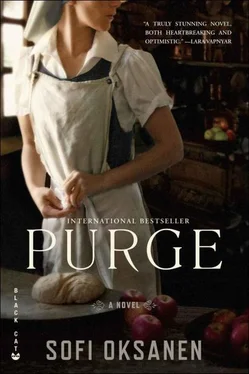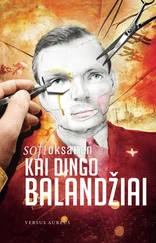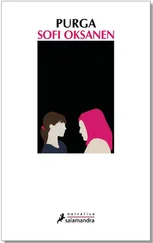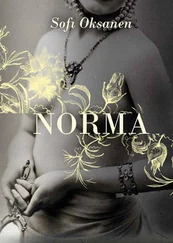Talvi didn’t play with Milvi any more after that. Martin was proud of Talvi. He thought she was marvelous. She was particularly marvelous when she said she wanted to have Lenin’s baby when she grew up. And Martin wasn’t at all concerned that she couldn’t tell a plantain from a dewdrop or a fly agaric from a milk cap, although Aliide wouldn’t have thought that possible for a child who shared the same genes as her and Ingel.
Läänemaa, Estonian Soviet Socialist Republic
Suffering Washes Memory Clean
While Martin took care of other aspects of child rearing, Aliide was responsible for everything that involved standing in line. As the years went by and Martin wasn’t summoned to Tallinn, the notion of his career potential diminished, and Aliide no longer expected him to get what they needed from the party-she stood in line to stand in line, arm in arm with Talvi, and thus taught her what a real Soviet woman’s life is like. She did avoid the meat line, because she had a friend, Siiri, at the butcher’s. When Siiri let her know that new stock had arrived, Aliide would weave her way through the overflowing trash bins to the back door of the shop, tugging Talvi behind her. She never did learn to walk slowly enough for the child, in spite of her best intentions, and always rushed along so the little girl had to run to keep up. Aliide knew she was behaving as if she wanted to get away from the child, but she couldn’t muster any guilt about it, and when she tried to look like a good mother she just felt more grotesque. It was better to focus on bragging to the other women about Martin’s fathering skills, completely blotting out her role as a mother in the process. Since Martin was a jewel of a father, they thought of Aliide as the luckiest of women.
Luckily the child grew and started to make her way behind her mother at a good clip through the swarm of flies behind the butcher’s. Sometimes the flies went up their noses or in their ears, and sometimes they found them in their hair later, or at least Aliide’s head itched so much that she was quite sure some of them had laid eggs in her scalp. The flies didn’t seem to bother Talvi-she didn’t even wave them away, she just let them strut along on her arms and legs, which disgusted Aliide. When they had left Siiri’s shop, Aliide would undo Talvi’s braids and shake out her hair. She knew it was silly, but she couldn’t help it.
On the day that Talvi had a dental exam at school, Aliide went to the back room at Siiri’s. Siiri was just washing the Semipalatinsk sausage in saltwater, a scrub brush in her hand. There was a pile of Tallinn and Moscow sausage waiting behind her. Their surfaces were crawling with maggots.
“Don’t worry. These are going to the front counter. A new load of fresh ones should arrive soon.”
When the load had come and gone, Aliide had piled up quite a haul in her bag: a couple of curled Polish sausages, a hunk of Krakova, and even some frankfurters. She was just presenting them to Martin when Talvi interrupted her shopping inventory with a surprising bit of news.
“Two big cavities.”
“What does that mean?” Aliide asked, startled at the sound of her own voice. It was like the whine of a dog that’s been struck. Talvi was already wrinkling her brow. The bundle of frankfurters had fallen on the table. Aliide pressed her hands against the oilcloth-they had started trembling again. She felt the knife marks in the waxy surface of the fabric, the bread crumbs and the dirt in the cracks. Something fell from the orange dome light: a fly’s filth falling from the surface of the lightbulb onto the back of her neck. The bottle of valerian was in the cupboard. Could she get it out and put a few drops in her glass without Martin noticing?
“What does it mean? It means you’re going to see Comrade Boris!” Martin laughed. “Do you remember Uncle Boris, Talvi?”
Talvi nodded. There was a bit of fat on the corner of Martin’s mouth. He bit off some more. The bits of fat in the Krakova sausage gleamed. Had Martin’s eyes always bulged like that?
“Were they sure?” Aliide said. “The people who looked at your teeth? That you have two cavities? Maybe we don’t need to do anything about it.”
“No, I want to go to town.”
“You heard her.” Martin grinned.
“Your father will buy you some ice cream there,” Aliide added.
“What?” Martin said, surprised. “Talvi’s certainly a big enough girl now to take the bus by herself.”
Talvi started to jump up and down.
“Yes! Yes! Yes!”
Now Aliide could think of nothing else, not one thing except that Martin must go with Talvi to the dentist. She would be safe with Martin. There was a buzzing in Aliide’s ears. She put the frankfurters and sausages in the refrigerator and started to put away the dishes with a clatter, at the same time secretly pouring the bottle of valerian into her glass. She chased it with water, and then some bread, so she wouldn’t have medicine on her breath.
“You could say hello to Boris while you’re there,” Aliide said. “Wouldn’t that be nice?”
“Yes it would, but my work…”
“Yes! Yes! Yes!” Talvi yelled, interrupting him. “All right then. We’ll think of something. We’ll have a lovely trip to the dentist.”
Talvi’s eyes were so much like Linda’s. Martin’s face and Linda’s eyes.
Läänemaa, Estonian Soviet Socialist Republic
The Smell of Cod Liver, the Yellow Light of a Lamp
The smell of chloroform floated from the door to meet her. In the waiting room, Aliide clung to a copy of Soviet Woman magazine, in which Lenin expressed the opinion that in a capitalist system, a woman was doubly oppressed-a slave to capital, regular work, and to housework. Aliide’s cheek was badly swollen; the cavity in her tooth was so deep that the nerve was visible. She should have taken care of it earlier, but who would want to sit in one of these barbersurgeons’ chairs? The real doctors had escaped to the West, the Jewish ones to the Soviet Union. Some of them had returned, but they were still scarce.
Aliide spelled out the words, tried to focus beyond the stabbing pain in her head. It is only in the Soviet Union and in people’s democracies that a woman works as a comrade, side by side with the men, in all fields, in agriculture and transportation as well as in teaching and the cultural professions, and takes an active part in political life and in running society. When Aliide’s turn came, she shifted her gaze from the magazine to the brown plastic floor mat and stared at it until she was in the chair, clinging to the armrests. The nurse was boiling needles and drill bits. She put them aside and came to give Aliide a shot, then went to prepare the filling material. The pot bubbled on the electric burner. Aliide closed her eyes, and the numbness spread all through her chin and cheeks.
The man’s hands smelled like onion, pickles, and sweat. Aliide had heard that the new dentist’s hand were so hairy it was a good thing you couldn’t feel anything; that way you didn’t mind his hairiness. And she’d heard it was best to shut your eyes so you couldn’t see the thick, black grove of hair. He wasn’t a real doctor at all, but during the war a German dentist who was a POW had tried to teach him what he could.
He started to pump the drill with his foot, it rasped and screeched, stabbed her ears, the crack of bone, and she tried not to think about the hairy hands. A fighter plane on maneuvers flew so low that the windows shook. Aliide opened her eyes.
It was the same man.
In that room.
The same hairy hands.
There in the basement of the town hall, where Aliide had vanished, where she just wanted to get out alive. But the only thing left alive was the shame.
Читать дальше












